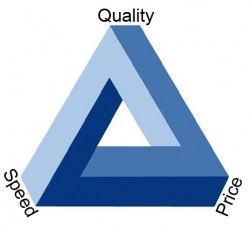Recently I was introduced to yet another small business with whole bunch of small business issues and the owner team who just don’t know any better. They, however, don’t believe it, so before this business perishes into nothing, I have a chance to study all the mistakes that were made and are being made. Here’s your chance to learn, too.
The scoop is as follows. It’s a service oriented business – think very niche cosmetic service with extra expensive equipment. It’s a startup – business isn’t even year old yet. Two non-working partners, one provides the equipment, another one is actually trying to manage the business (he never worked in this business before). Two workers, both part-time, who are only paid commissions for cosmetic procedures they perform on clients. Cell phone to take client’s calls. Company is renting a room at another salon to perform procedures.
Issue 1: Human Resources
This one is first, because it’s the most major issue in the business. Since this is a startup, everything rests upon the shoulders of people who work for business. Now, the partner who runs the business spends enormous amounts of time to watch the two people who work for him. Being technologically challenged, he calls whoever has the company’s cell phone for 20 times a day to check how things are going and if there are any appointments made. He also made a deal with salon owner to check how many clients come in every day when one of his people is working. He clearly has an issue with trusting his own employees (those who work on commissions only because business hasn’t got up on its feet yet) and doesn’t bother to hide it. This, however, didn’t prevent him from demanding that they would take phone calls on their personal phones (they declined it), that they come up with better ways for him to track their performance (they ignored it) and that they take incoming calls throughout the whole week on their personal time outside of work (they agreed because that’s the only way they can book enough appointments to make it worth working in this business). All appointments are written into the journal, so every time the shift changes (each part time employee works a few days every other week) both workers have to find ways to transfer the journal and cell phone to each other.
Of course such treatment from the managing partner doesn’t win employees’ hearts. Aside from openly despising their manager, employees don’t particularly pay much attention neither to quality of the services performed nor to a higher level of customer service. In a market where customer services is by far the most significant competitive advantage, it’s completely lost on this company. Additionally, given that employees are only paid commissions for performed procedures, they have zero incentive to work an extra minute, so they always stuff as many appointments as possible into as little time frame as they possibly can. Given that clients oftentimes don’t show up it proved to be a worthy tactics, but on the days when everyone shows up on time – it gets a bit messy.
(To be continued)
 The trade-offs that small businesses are making are wrong. Well, most of them are. Look at the picture on the left and it will get obvious that you can’t just tweak one of the parameters without compromising other two.
The trade-offs that small businesses are making are wrong. Well, most of them are. Look at the picture on the left and it will get obvious that you can’t just tweak one of the parameters without compromising other two.